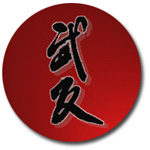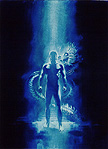Training

Background:
The Bujinkan New Jersey Dojo is a practicing group of Japanese Budo Taijutsu enthusiasts. Internationally, our group is known as the Bujinkan Buyū Dojo [Warrior Friends School]. The head instructor is Jack Hoban. We meet at Wesley Hall Auditorium in Spring Lake, NJ on Wednesday nights from 7 - 8:30pm. Directions are here. "For out-of-towners," we have an all day seminar once a month on a Saturday.
Training fees are:
- $60.00 per month, or,
- $15.00 per class
- Monthly seminars fees are not included.
There are a number of Bujinkan Buyū Dojos, as well as other Buyū groups popping up here and there. Check the Internet WIN Yellow Page for training opportunities in other areas. Fees may differ in other areas.
About The Training | Directions | What To Bring | Seminars | Home Page
ABOUT THE BUJINKAN BUYŪ DOJO TRAINING
The Bujinkan is a set of nine Japanese martial art schools (or styles):
- Togakure Ryu Ninpo
- Gyokko Ryu Koshijutsu
- Kuki Shinden Ryu Happo Hiken
- Koto Ryu Koppojutsu
- Gikan Ryu Koppo
- Shinden Fudo Ryu Dakentaijutsu
- Gyokushin Ryu Ninpo
- Kumogakure Ryu Ninjutsu
- Takagi Yoshin Ryu Jutaijutsu
Included are hitting, grappling, escaping, and weapons systems. These martial arts are not sport martial arts. Therefore there are no formal competitions or tournaments. Ranks are awarded when the student demonstrates competency and an appropriate level of commitment.
Training is for:
- Acquiring the capability of defending self and others
- Maintaining a compassionate attitude toward others
- Cultivating a natural lifestyle
The Grandmaster is Masaaki Hatsumi of Noda, Japan
Initially, the curriculum will consist of:
- Junan Taiso conditioning and flexibility exercises
- Ukemi injury prevention
- San shin no kata exercises for developing a strong body and clear spirit
- Kihon Happo fighting scenarios
The training will evolve eventually into a wider curriculum including:
- Kata advanced fighting scenarios from the different ryū-ha
- Henka fight variations
- Budogu martial art fighting tools:
- bojutsu stick-fighting (including hanbo, jo, rokushakubo, yari, and naginata/bisento)
- tantojutsu and kenjutsu blade-fighting
- kusari-fundojutsu flexible weapons-fighting
The official Bujinkan guidelines for training may be found here:
Dojo Etiquette:
Black Japanese martial arts do-gis (training uniforms) and an appropriate colored belt are worn in our training. If you already have a white training uniform, there is no need to buy a new one until you wish to or the old one wears out. Belt ranks are as follows:
| Rank | Color | Time in Grade (approx.) |
|---|---|---|
| Shoshinsha | white | 3-6 months |
| 9th-1st kyu | green | 4 months per kyu |
| 1st-4th dan | black | 1 year per dan |
| 5th dan and above | Black | Receive from Japan only |
Although we take a relaxed approach to the training, certain formalities (bowing, etc.)are observed while actually involved in giving and receiving instruction.
In the adults class, we do not use honorifics as a rule, but they are not inappropriate. Geniality and respect between all training members, student and teacher, is the rule and will be observed. Students should also be aware of certain courtesies that will make them more comfortable if there should be an opportunity to go to Japan and study, or if a Japanese instructor visits us.
The classes are conducted in a supportive, non-competitive atmosphere with the emphasis on safety. The reason for this is because, as mentioned, the techniques are real and have not been adapted for use as a sport. They must be practiced in a certain way or injury will result.
Realistic fight distancing is used at all times. Therefore the speed at which technique exchanges occur must be appropriate for the level and ability of the participants; training dynamics must be mutually agreed on in advance by "attacker" and "receiver."
All members train together when possible. There is no "caste" system. Rank and seniority bring responsibility rather than privilege.

Philosophy:
Our philosophy is simple: Protect life. Live according to nature and the natural law. All people's lives are equal (even if their behavior isn't) and must be respected, and if possible, protected.
As Hatsumi Sensei wrote: "Shinobi no ho, or Ninja methods, are for discerning what is right for the world, enduring, training to become a moral being, becoming aware of one's destiny, and dedicating one's life to other people or the world as a whole."
In addition to Hatsumi Sensei's teachings, our training group has adopted the "Ethical Warrior" philosophy of the late Robert L. Humphrey. Mr. Hoban is also one of the founders and remains a Subject Matter Expert for the Marine Corps Martial Arts Program. Accordingly, there are certain aspects of our training that strongly reflect those influences.

Those that agree with our training philosophy, will be instructed in the skills needed to support that perspective, regardless of age, health, gender, or cultural distinction. On the other hand, we are not an "obedience school." If you cannot summon up the personal discipline to train with a friendly and courteous demeanor, you will probably feel out of place and quit the training. People who are looking for a competitive, aggressive atmosphere will probably be disappointed and quit as well. Make no mistake ,however, the training is challenging. Once you acquire the skills, you will be capable of walking through life as a warrior knight.





